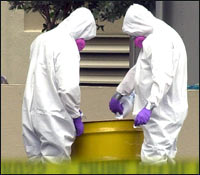
On the morning of October 12, Eva Anderson, NBC’s in- house doctor, called dermatologist Steven Victor. There were 29 freaked-out people in her waiting room, Anderson told him, and she didn’t know what anthrax looked like. They reviewed the symptoms together. Later, he says, his receptionist handed him the mail and said, “Open it yourself.”
The closest that Upper East Side dermatologist Stephen Kurtin has ever gotten to anthrax was when he was studying for his boards three decades ago. (“You read about a blister that became pus-filled, then became a scabbed-over blister. It’s big,” he recalls helpfully.) Since the attack on the World Trade Center, Kurtin has written more than 100 prescriptions for Cipro, the antibiotic of choice for treating anthrax (some doctors also believe in the efficacy of doxycycline). On the NBC News diagnosis, Kurtin’s receptionist went into overdrive, fielding some twenty calls an hour from desperate patients, and Kurtin kept scribbling on his pad. “I have a child in Florida, in Atlanta, and Boston, and I’ve sent it to them,” he says. “I’ve brought it home for my wife and me,” he says. “And if I’m doing it for myself, how can I not do it for my patients?”
Though the panic reached virtually every doctor’s office in Manhattan, few were so expansive in distributing prescriptions. “Our concern is that people are going to start treating themselves,” says gastroenterologist Karl Bednarek. “With flu season coming on, people are going to panic and self-medicate because they’ll think a cough is anthrax. But some people may have allergies to it, and they’re going to have trouble.
“The other concern,” he adds, “is that people will take it prophylactically and build up a resistance,” a worry shared by many doctors. “We tell people there’s some window of opportunity to begin taking the medicine. They’re not going to get into deeper trouble by not having it onboard day one.” The city is similarly worried. “We are not testing people,” said Health Department deputy commissioner Benjamin Mojica, “but targeting those who really may have been exposed.” The department has sent a letter to emergency rooms around the city explaining the policy.
At the office of an infectious-disease specialist on Friday, dozens of patients were asking for Cipro. “Generally I’ve said no, but I’ve succumbed to my more forceful friends,” says the doctor, who thinks that right now, better they should take some advice than some Cipro (which, in any case, is virtually impossible to score). “If you open a letter and there’s powder in it, put it on your desk, leave the office, close the door, call 911-and go see your doctor. Don’t carry the letter through the hall and say, ‘See what I got.’ ”
Pediatrician Ramon Murphy is determinedly passing on the word from the Centers for Disease Control and the Department of Health: There is no indication that panic is warranted. “I think we’re dealing with our own fear right now, which make for a powerful desire to do something,” he says. Hysteria and Cipro should not be viewed as first options.
“People are begging for antibiotics, and if they’re hammered enough, some doctors will give it to them, but I don’t think it should be done,” says Murphy. He signs off to go attend to all the ringing phones. “I’ve got four calls waiting that I’m sure are about anthrax-and one about a sprained ankle. I’m going to take the sprained ankle first.”
Additional reporting by Beth Landman Keil